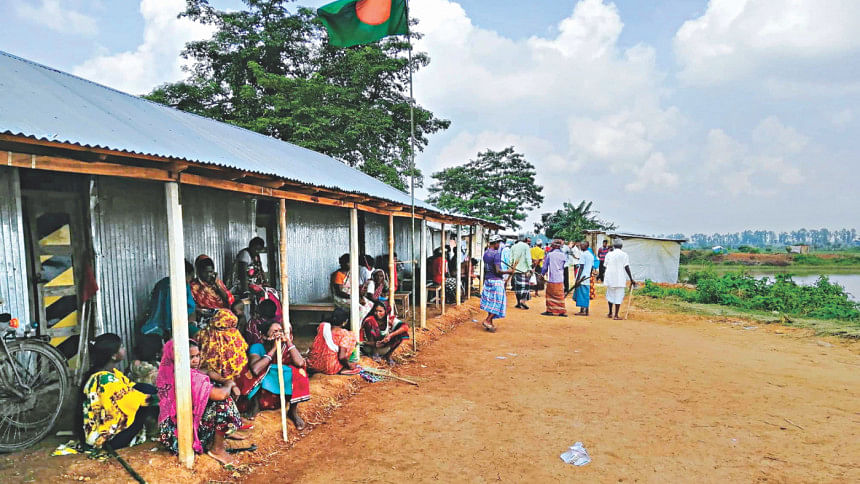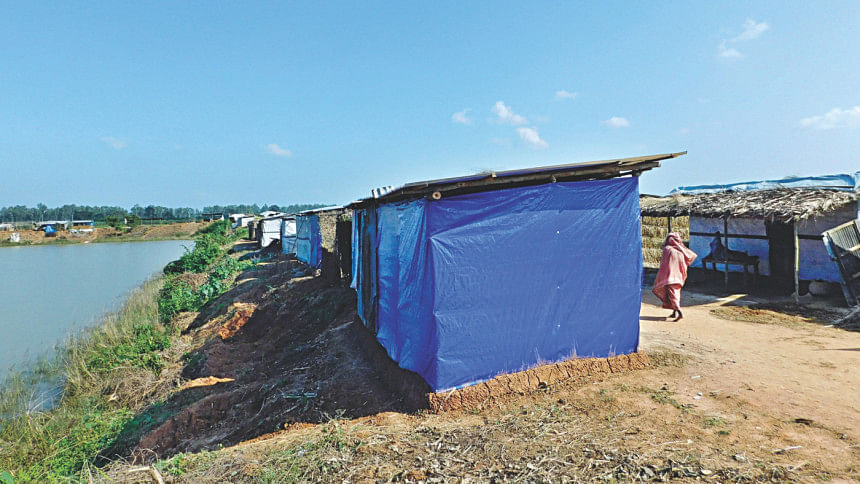Killing of Three, Eviction: Justice still eludes santals

Santals who were evicted from a sugarcane farm in Gaibandha three years ago are yet to get justice for the killing of three of their men and compensation for the loss of their livelihood.
Instead, many members of this landless indigenous community of Gobindaganj upazila have to fight cases filed against them by police, Rangpur Sugar Mill authorities and their associates.
On November 6, 2016, more than 2,000 Santal and Bangalee families were ousted from the “disputed” farmland, on which Rangpur Sugar Mill was established.

The eviction took place following a violent clash between the families, mill employees and police. Three Santal men were killed and 20 others, including nine policemen, injured.
Tatu Tudu, 57, a day labourer and the brother of Romesh Tudu, who was killed during the clash, was made an accused in eight cases.
“Every month, I have to appear five to eight times before court as part of my bail condition. Now, I am not able to go outside the upazila to look for work,” he said.
Philimon Baske, president of the Shahebganj-Bagda Farm Bhumi Uddhar Sangram Committee, said that more than 100 accused Santals like Tatu have to borrow about Tk 500 to Tk 600 per month to cover legal expenses, including travelling to court.
Sufal Hembrom, 65, from Joypurpara village said, “Police and mill authorities filed eight cases against me after the eviction. Because of lack of work and shortage of money, it has become very difficult for me to appear before court every five days.”
STATUS OF THE CASES
Zakirul Islam, sub-inspector of Gobindaganj police station and also the investigation officer of the cases, said 12 cases were filed before and after the clash -- eight against the evicted Santals and Bangalees and four against police and mill staffers.
He said that charge sheets in only three cases and final reports in four had been submitted so far due to a lack of evidence.
One of the cases that police claimed lacked evidence was for attempted rape. A Santal woman filed it against three mill security guards on June 19, 2017.
Meanwhile, Gaibandha’s Police Bureau of Investigation (PBI) dropped the names of 11 prime accused from the charge sheet in a case filed by one Thomas Hembrom, alleged the members of the indigenous community.
These 11 include former MP Abul Kalam Azad, former managing director of the Rangpur Sugar Mill Abdul Awal, its former general manager Abdul Mazid, former UNO of the upazila Abdul Hannan, and Chairman of the Katabari Union Parishad Rezaul Karim Rafik.
The charge sheet also did not have the names of any police officials as accused, even though a video footage of the attack showed their involvement. Two cops were also suspended in 2017, following a police investigation.
An investigation by a judicial magistrate also found the involvement of three policemen in the attack.
Mohammad Abdul Hai Sarker, assistant superintendent of police (PBI-Gaibandha), said, “We did not get any evidence of involvement of some of the people who the Santal mentioned as the prime accused in their case statement. Therefore, we dropped their names from the charge sheet.”
He added that the video footage did not provide “sufficient evidence” and they did not find witnesses to give statements against the suspended police officials.
Santal leaders have presented a no-confidence petition to the Gobindaganj Senior Judicial Magistrate Court on September 04 against the PBI’s charge sheet and the next hearing on the petition is on December 12, according to court sources.
NO REHABILITATION YET
Santal leaders claimed that, at a meeting held in December 2016, government high-ups had promised to rehabilitate them to their ancestral land in Shahebganj sugarcane farm.
“Even after three years, there is no sign of fulfilling our demand from the government side,” said Philimon.
Meanwhile, at least 300 evicted Santal families went back to the farm in October and started living there in make-shift houses and tents, defying the threat of eviction by local administration and mill authorities.
ORIGIN OF THE DISPUTE
During the Pakistan regime, the government had acquired 1,840 acres of land at Shahebganj for the Pakistan Industrial Development Corporation, which subsequently set up Rangpur (Mahimaganj) Sugar Mills between 1954 and 1957.
In 1962, the then DC office, on behalf of land owners, who were the forefathers of the evicted Santals and Bangalees, signed an agreement with the corporation stating that the land was acquired for cultivation of sugarcane by the mill authorities and that the corporation would return the land to the government if it was used for any other purpose.
However, the deal was violated by the mill authorities as they leased out most of the land in 2004, 2009 and 2015 for cultivation of other crops.
Backed by some politicians, the Santals reportedly started building houses on the land around July 2016 after they learned about the mill authorities’ breach of contract, due to which the clash broke out in November of that year.

 For all latest news, follow The Daily Star's Google News channel.
For all latest news, follow The Daily Star's Google News channel. 



Comments